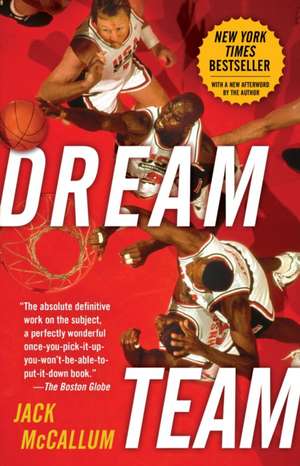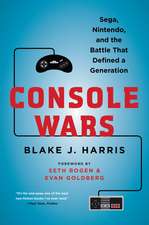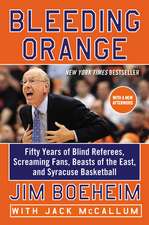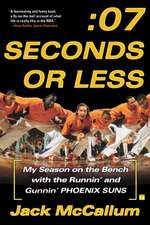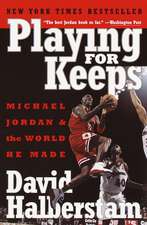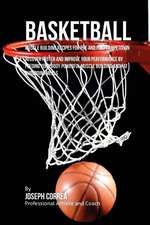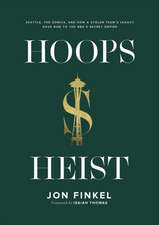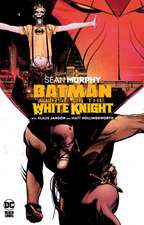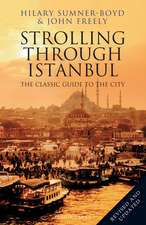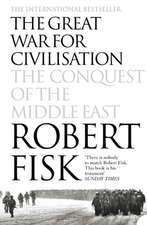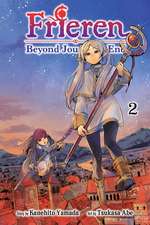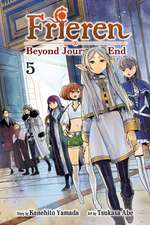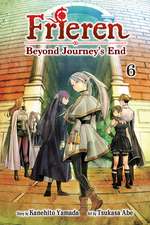Dream Team
Autor Jack McCallumen Limba Engleză Paperback – 29 apr 2013
Acclaimed sports journalist Jack McCallum delivers the untold story of the greatest team ever assembled: the 1992 U.S. Olympic Men’s Basketball Team. As a writer for Sports Illustrated, McCallum enjoyed a courtside seat for the most exciting basketball spectacle on earth, covering the Dream Team from its inception to the gold medal ceremony in Barcelona. Drawing on fresh interviews with the players, McCallum provides the definitive account of the Dream Team phenomenon. He offers a behind-the-scenes look at the controversial selection process. He takes us inside the team’s Olympic suites for late-night card games and bull sessions where superstars like Michael Jordan, Magic Johnson, and Larry Bird debated the finer points of basketball. And he narrates a riveting account of the legendary intrasquad scrimmage that pitted the Dream Teamers against one another in what may have been the greatest pickup game in history. In the twenty years since the Dream Team first captivated the world, its mystique has only grown. Dream Team vividly re-creates the moment when a once-in-a-millennium group of athletes came together and changed the future of sports—one perfectly executed fast break at a time.
With a new Afterword by the author
“The absolute definitive work on the subject, a perfectly wonderful once-you-pick-it-up-you-won’t-be-able-to-put-it-down book.”—The Boston Globe
“An Olympic hoops dream.”—Newsday
“What makes this volume a must-read for nostalgic hoopsters are the robust portraits of the outsize personalities of the participants, all of whom were remarkably open with McCallum, both then and now.”—Booklist (starred review)
Preț: 118.17 lei
Nou
Puncte Express: 177
Preț estimativ în valută:
22.61€ • 23.52$ • 18.67£
22.61€ • 23.52$ • 18.67£
Carte disponibilă
Livrare economică 24 martie-07 aprilie
Livrare express 08-14 martie pentru 23.75 lei
Preluare comenzi: 021 569.72.76
Specificații
ISBN-13: 9780345520494
ISBN-10: 0345520491
Pagini: 358
Ilustrații: 8-Page Colour Photo Insert
Dimensiuni: 131 x 203 x 23 mm
Greutate: 0.3 kg
Editura: BALLANTINE BOOKS
ISBN-10: 0345520491
Pagini: 358
Ilustrații: 8-Page Colour Photo Insert
Dimensiuni: 131 x 203 x 23 mm
Greutate: 0.3 kg
Editura: BALLANTINE BOOKS
Extras
CHAPTER 1
THE INSPECTOR OF MEAT
Pros in the Olympics? It Was His Idea, and Don’t Let Anyone Tell You Different
He first came to the United States in January 1974, dispatched by his boss to study up on American basketball. He didn’t speak the language, didn’t know the customs, and settled into the basketball hotbed of Billings, Montana, because that’s where he could secure free lodging with a Yugoslavian family.
This stranger in a strange land was named Boris Stankovic. He was six months from his forty-ninth birthday and he had come on behalf of FIBA. At the time not more than a dozen Americans knew what it stood for (Fédération Internationale de Basketball), where it was headquartered (at the time in an apartment in Munich, later in Geneva), and what the hell it did (governed amateur basketball in all parts of the world except the United States). “You cannot know basketball if you do not know basketball in the United States,” Stankovic was told by R. William Jones, who as secretary-general ran FIBA with a bow tie, a lit cigar, and a dictator’s fist. So Stankovic came and was instantly seduced by the college games he saw live—UCLA’s redheaded phenomenon, Bill Walton, was his favorite player—and the NBA games he saw on television.
For much of his early adult life, Stankovic had been a meat inspector in Belgrade. “My job was to look over the meat and cheese and, as you do here, put a stamp on it,” said Stankovic when I interviewed him in Istanbul in the summer of 2010. He is retired now but comes to many events as the éminence grise of international basketball. Stankovic had earned a degree in veterinary medicine in 1945 from the University of Belgrade. “It was natural in our country that veterinarians looked after the meat and cheese, because it has to do with animals, no?”
The type of meat Stankovic most liked to inspect, though, was the cured leather on a basketball. Even as he was arising at five in the morning to take up his meat stamp and lace up his white apron, basketball is what moved his spirit. He was an earthbound, fundamentally sound low-post forward who played thirty-six games for the Yugoslavian national team. One of his proudest moments was playing for his country in the first world championship organized by FIBA, which took place in Argentina in 1950. “We finished ninth,” says Stankovic, chuckling, “and there were nine teams.” One of his enduring regrets was that he never participated in the Olympics as a player.
The Yugoslavs were a tall, tough, and lean people, hardened by wars civil and foreign. In the Balkan area of Yugoslavia where Stankovic was born, the people measure eras not by “war and peace” but by “war and non-war.” When Boris was nineteen, he and his father, Vassilje, a lawyer who fought for Serbian nationalism, were imprisoned by an invading Russian army. After two months Boris was released, but Vassilje was executed by firing squad and buried in a common grave; even today, Stankovic does not know where. Stankovic was put on a blacklist that later kept him from becoming a medical doctor, his desired profession, and forced him to veterinary school, his way of staying in the field of medicine. Like most of his countrymen from that generation, he identified with the Serbian rebels who had squirmed under foreign rule for five centuries. “They lived in groups and learned to cooperate, to work with each other,” Stankovic said. “We grew up with that in our blood. We Serbians have never had much success in the individual sports, but our team sports are very, very strong. We have a proficiency in and an aptitude for sports that require a lot of teamwork.”
Stankovic’s knowledge of the game and overall intelligence—virtually anyone who talks about him invariably mentions his brains—enabled him to rise steadily as a coach and executive. By the time he was thirty he was the most important nonplayer in Yugoslavian basketball, even as he continued to inspect meat, and had already become active in FIBA.
In 1966 Oransoda Cantù, a team in the Italian professional league, came calling in search of a coach, and Stankovic left his homeland. “I went for the money,” says Stankovic. “Italy was the richest league.” He was reviled by many Italians as an outsider but later grew to be loved, as winners usually are, when his team captured the championship in 1968. That’s when R. William Jones beckoned him back. Jones had seen the future of FIBA, and its name was Boris Stankovic.
Jones, who died in 1981, months after suffering a stroke during a dinner at the 1980 Moscow Olympics, was the kind of man for whom the term “grudging admiration” seems to have been invented. Born in Rome to a British father and French mother, he had earned a degree from Springfield College, where Dr. James Naismith hung up his first peach basket. Jones was “a very international guy” (Stankovic’s words), a combination that made him an undeniable basketball visionary. But he was also the classic amateur-sport pasha, imperious and intractable. For basketball people in the United States, Jones left his enduring imprimatur by allowing the Soviets three chances to win the gold medal against the U.S. team on September 9, 1972, at the star-crossed Olympic Games in Munich.
Stankovic was a long way from being an established leader when he first came to the United States on that intelligence-gathering trip in 1974. He was just an outsider trying to learn the nuances of American basketball while also trying to learn how to order a hamburger. He was granted a papal audience with John Wooden—“We talked basketball, so it was easy to communicate,” he says—but mostly he was left on his own, to watch, listen, and compare.
And what happened was that a basketball junkie was transfixed by the American players, college and pro. “It just seemed to be a different game,” says Stankovic, smiling at the memory. “Faster but also fundamentally sound. You watched a guy like Bill Walton for one minute and you could see that his level was so much higher than anyone we had in Europe.”
FIBA’s rules at the time banned professionals from playing under the FIBA banner, and the rules of FIBA were the rules of Olympic basketball. So it was, so it had always been, and so, everyone thought, it would always be. The hypocrisy, of course, was that de facto professionals were playing anyway, since international basketball teams always comprised their country’s top players, even if they were officially listed as “soldiers” or “policemen.”
With the lone exception of Stankovic, there was no push to include American pros in the Olympics, since the supremacy of even American collegians was considered self-evident, the anomaly of 1972 notwithstanding. Plus, it was simply part of our sporting ethos that the Olympics were for our college players. The NBA and the Olympics were planets rotating in different solar systems.
But the Inspector of Meat, an outsider, didn’t see it that way. As he watched the pro stars of the 1970s on TV—among them Oscar Robertson and Jerry West, plus his two favorites, Walt Frazier and Pete Maravich—it began to gnaw at him that America’s best players would never participate in the Olympic Games. “The hypocrisy was what got to me,” said Stankovic. “And there was a practical side. My concern was trying to make the game of basketball strong, to grow it, and yet there was this separation. It became impossible for me to tolerate.”
There might’ve been a self-serving side, too. Stankovic saw himself as the messiah of hoops, the person to lift the game above King Futbol. And he was irritated by the fact that his organization—the We-Have-the-Final-Say Court of All Appeals for world basketball—came with an asterisk because it wasn’t even a blip on the NBA’s radar screen.
Whatever the variety of reasons, Stankovic came back to Munich and told Jones that dropping the amateurs-only clause, thus clearing the way for America’s best players to compete in the Olympics, should be a FIBA goal—a truly anarchic idea, given the sociopolitical sports climate. The times might’ve been a-changin’, but not in the International Olympic Committee (IOC), where Avery Brundage—a loathsome individual, a clear number one on the list of tin-pot despots who have run sports over the centuries—held fast to the concept of shamateurism.
Stankovic isn’t sure what Jones really thought of his idea, but his boss’s instruction was crystal clear. “He said, ‘Don’t bother,’” remembers Stankovic. “Or, as you say in America, ‘Don’t go there.’”
And for the next decade and a half, no one except Boris Stankovic went there.
Like many influential men and women throughout history, the Inspector of Meat is overlooked. He has never met Magic Johnson or Larry Bird, and the only time he has crossed paths with Michael Jordan was in the 1984 Olympics, in the preߝDream Team days.
But whatever revisionist history might eventually be written, remember this: the Dream Team resulted from the vision of Boris Stankovic. It was not a secret plot hatched by David Stern to “grow the game,” one of the commissioner’s favorite phrases. It was not the result of a crusade by the NBA’s marketing demons to sell $200 Authentics in Europe, even though that was an eventuality. It was not frustration built up by the increasing reality that inroads were being made on the United States’ claim of basketball supremacy. The idea germinated in the mind of the Inspector of Meat from Belgrade.
Chapter 2
The Chosen One
Sneaker Porn Is Born
It was some rare time away from Bob Knight, their dictatorial Olympic coach, and two candidates for the 1984 U.S. team, Michael Jordan and Patrick Ewing, were taking advantage of it by horsing around in their dorm room. Wild in-room wrestling matches were a major diversion for the collegians, particularly Charles Barkley and Chuck Person, two Auburn teammates who went at it pretty hard before they ended up on Knight’s very roomy chopping block.
Jordan, who had just completed his junior year at North Carolina, was heading for the NBA, while Ewing would be going back to complete his senior year at Georgetown. They were already good friends, having first met at high school all-star games and, more eventfully, in the 1982 NCAA final. It was there that a jump shot by North Carolina freshman Jordan led the Tar Heels to a 63ߝ62 victory over freshman Ewing and his Georgetown Hoyas. Though no one realized the significance of it at the time, Ewing became the first of many great players to be stopped short of the finish line by Jordan.
The 6'6" Jordan had the 7'0" Ewing in a headlock. Neither young man was angry, but that didn’t mean it wasn’t semiserious: to Jordan, everything of a competitive nature had some degree of seriousness. Finally Ewing said uncle, and when the big center awoke the next morning, he couldn’t move his neck.
Man, was this going to be a tough conversation.
“Coach, I can’t practice this morning,” Ewing told Knight after screwing up his courage.
“What happened?” said Knight, and Ewing was forced to tell the whole story, giving up Jordan as the culprit.
“So I sat out, and man, Coach Knight was mad,” Ewing remembers years later. “But only at me. Michael? Nothing happened to him. Nothing ever happened to Michael.”
Yes, the summer of 1984 was a glorious one for Michael Jordan, the first of many, despite the fact that he had been initially resistant to the idea of competing in Los Angeles. “I was a little intimidated by Coach Knight,” Jordan told me in the summer of 2011. “I didn’t like his tactics, heard he ragged players, swore at them, and I didn’t want to spend the summer being berated by someone.” So he sought the counsel of his coach, Dean Smith, with whom he had a kind of father-son relationship, although Jordan’s own father, James, was a strong influence in his life.
“Coach Smith told me that all Knight wants to see is the fundamentals of the game of basketball,” Jordan said. (Even in casual conversation Jordan uses the phrase “the game of basketball” almost as if he’s describing holy writ.) “I had those fundamentals, so there shouldn’t be a problem. And once I got there I just saw a man who demanded you play the game a certain way and don’t make the same mistake twice. I didn’t.”
The summer was glorious, too, for the men who ran amateur basketball in the United States. The Olympic boycott of 1980, which had so soured them against President Jimmy Carter, was a distant memory. A solid team full of eager collegians—anchored by Jordan, whose singular skills, if not known worldwide, were certainly recognized in the United States, where he had just finished a gilded college career—was about to storm to the gold medal in Los Angeles. When the Soviets returned the 1980 favor by boycotting the L.A. Games, it seemed not to matter all that much. The U.S. collegians would’ve beaten that group anyway, or so went the thinking.
Knight was right out of the amateur hoops handbook, a tyrant of the first order but one of them, a dedicated (if sometimes out of control) disciple of ABAUSA, the group that ran amateur hoops at the time. “With Bobby in charge,” says C. M. Newton, one of his assistants, “there was no hoopla. It was straight down the path.”
Knight made the Olympic trials a Darwinian exercise from start to finish. More than a hundred players were invited, and they got cut twenty at a time. Karl Malone, a muscular but largely unknown player from Louisiana Tech, remembers that the early cuts had an impersonal feel. “You went through the lunch line in this big cafeteria, where they had a big bulletin board,” remembers Malone. “If your name was on the board, you were in.” One day Malone’s name wasn’t on the board. Eventually that freak of nature named Charles Barkley was cut. So was a guard named John Stockton.
There was a segment of the basketball population that didn’t completely buy into Jordan when he was at North Carolina, where, as common logic had it, the only one who could stop him was Smith, a rigid fundamentalist whose teams often held the ball. Anyone with one working eye and a semifunctional cortex knew that Jordan was going to be spectacular in the pros, but one supposition was that he would be a Clyde Drexler type, referencing the University of Houston product who had just finished his first season with the Portland Trail Blazers—that is, flashy but sometimes out of control, a scorer but not a shooter, a fan favorite but not a coach’s choice.
Though that impression would endure in some quarters until 1991, the year Jordan won his first championship with the Chicago Bulls, the basketball cognoscenti watching the L.A. Games saw what it really had in Jordan. He was a player who could break a zone with a jumper, lock down a high-scoring opponent, run the offense from the point if he had to. He could please Bobby Knight, for God’s sake. “The 1984 Olympics,” says David Falk, his agent, “was Michael’s coming-out party.”
THE INSPECTOR OF MEAT
Pros in the Olympics? It Was His Idea, and Don’t Let Anyone Tell You Different
He first came to the United States in January 1974, dispatched by his boss to study up on American basketball. He didn’t speak the language, didn’t know the customs, and settled into the basketball hotbed of Billings, Montana, because that’s where he could secure free lodging with a Yugoslavian family.
This stranger in a strange land was named Boris Stankovic. He was six months from his forty-ninth birthday and he had come on behalf of FIBA. At the time not more than a dozen Americans knew what it stood for (Fédération Internationale de Basketball), where it was headquartered (at the time in an apartment in Munich, later in Geneva), and what the hell it did (governed amateur basketball in all parts of the world except the United States). “You cannot know basketball if you do not know basketball in the United States,” Stankovic was told by R. William Jones, who as secretary-general ran FIBA with a bow tie, a lit cigar, and a dictator’s fist. So Stankovic came and was instantly seduced by the college games he saw live—UCLA’s redheaded phenomenon, Bill Walton, was his favorite player—and the NBA games he saw on television.
For much of his early adult life, Stankovic had been a meat inspector in Belgrade. “My job was to look over the meat and cheese and, as you do here, put a stamp on it,” said Stankovic when I interviewed him in Istanbul in the summer of 2010. He is retired now but comes to many events as the éminence grise of international basketball. Stankovic had earned a degree in veterinary medicine in 1945 from the University of Belgrade. “It was natural in our country that veterinarians looked after the meat and cheese, because it has to do with animals, no?”
The type of meat Stankovic most liked to inspect, though, was the cured leather on a basketball. Even as he was arising at five in the morning to take up his meat stamp and lace up his white apron, basketball is what moved his spirit. He was an earthbound, fundamentally sound low-post forward who played thirty-six games for the Yugoslavian national team. One of his proudest moments was playing for his country in the first world championship organized by FIBA, which took place in Argentina in 1950. “We finished ninth,” says Stankovic, chuckling, “and there were nine teams.” One of his enduring regrets was that he never participated in the Olympics as a player.
The Yugoslavs were a tall, tough, and lean people, hardened by wars civil and foreign. In the Balkan area of Yugoslavia where Stankovic was born, the people measure eras not by “war and peace” but by “war and non-war.” When Boris was nineteen, he and his father, Vassilje, a lawyer who fought for Serbian nationalism, were imprisoned by an invading Russian army. After two months Boris was released, but Vassilje was executed by firing squad and buried in a common grave; even today, Stankovic does not know where. Stankovic was put on a blacklist that later kept him from becoming a medical doctor, his desired profession, and forced him to veterinary school, his way of staying in the field of medicine. Like most of his countrymen from that generation, he identified with the Serbian rebels who had squirmed under foreign rule for five centuries. “They lived in groups and learned to cooperate, to work with each other,” Stankovic said. “We grew up with that in our blood. We Serbians have never had much success in the individual sports, but our team sports are very, very strong. We have a proficiency in and an aptitude for sports that require a lot of teamwork.”
Stankovic’s knowledge of the game and overall intelligence—virtually anyone who talks about him invariably mentions his brains—enabled him to rise steadily as a coach and executive. By the time he was thirty he was the most important nonplayer in Yugoslavian basketball, even as he continued to inspect meat, and had already become active in FIBA.
In 1966 Oransoda Cantù, a team in the Italian professional league, came calling in search of a coach, and Stankovic left his homeland. “I went for the money,” says Stankovic. “Italy was the richest league.” He was reviled by many Italians as an outsider but later grew to be loved, as winners usually are, when his team captured the championship in 1968. That’s when R. William Jones beckoned him back. Jones had seen the future of FIBA, and its name was Boris Stankovic.
Jones, who died in 1981, months after suffering a stroke during a dinner at the 1980 Moscow Olympics, was the kind of man for whom the term “grudging admiration” seems to have been invented. Born in Rome to a British father and French mother, he had earned a degree from Springfield College, where Dr. James Naismith hung up his first peach basket. Jones was “a very international guy” (Stankovic’s words), a combination that made him an undeniable basketball visionary. But he was also the classic amateur-sport pasha, imperious and intractable. For basketball people in the United States, Jones left his enduring imprimatur by allowing the Soviets three chances to win the gold medal against the U.S. team on September 9, 1972, at the star-crossed Olympic Games in Munich.
Stankovic was a long way from being an established leader when he first came to the United States on that intelligence-gathering trip in 1974. He was just an outsider trying to learn the nuances of American basketball while also trying to learn how to order a hamburger. He was granted a papal audience with John Wooden—“We talked basketball, so it was easy to communicate,” he says—but mostly he was left on his own, to watch, listen, and compare.
And what happened was that a basketball junkie was transfixed by the American players, college and pro. “It just seemed to be a different game,” says Stankovic, smiling at the memory. “Faster but also fundamentally sound. You watched a guy like Bill Walton for one minute and you could see that his level was so much higher than anyone we had in Europe.”
FIBA’s rules at the time banned professionals from playing under the FIBA banner, and the rules of FIBA were the rules of Olympic basketball. So it was, so it had always been, and so, everyone thought, it would always be. The hypocrisy, of course, was that de facto professionals were playing anyway, since international basketball teams always comprised their country’s top players, even if they were officially listed as “soldiers” or “policemen.”
With the lone exception of Stankovic, there was no push to include American pros in the Olympics, since the supremacy of even American collegians was considered self-evident, the anomaly of 1972 notwithstanding. Plus, it was simply part of our sporting ethos that the Olympics were for our college players. The NBA and the Olympics were planets rotating in different solar systems.
But the Inspector of Meat, an outsider, didn’t see it that way. As he watched the pro stars of the 1970s on TV—among them Oscar Robertson and Jerry West, plus his two favorites, Walt Frazier and Pete Maravich—it began to gnaw at him that America’s best players would never participate in the Olympic Games. “The hypocrisy was what got to me,” said Stankovic. “And there was a practical side. My concern was trying to make the game of basketball strong, to grow it, and yet there was this separation. It became impossible for me to tolerate.”
There might’ve been a self-serving side, too. Stankovic saw himself as the messiah of hoops, the person to lift the game above King Futbol. And he was irritated by the fact that his organization—the We-Have-the-Final-Say Court of All Appeals for world basketball—came with an asterisk because it wasn’t even a blip on the NBA’s radar screen.
Whatever the variety of reasons, Stankovic came back to Munich and told Jones that dropping the amateurs-only clause, thus clearing the way for America’s best players to compete in the Olympics, should be a FIBA goal—a truly anarchic idea, given the sociopolitical sports climate. The times might’ve been a-changin’, but not in the International Olympic Committee (IOC), where Avery Brundage—a loathsome individual, a clear number one on the list of tin-pot despots who have run sports over the centuries—held fast to the concept of shamateurism.
Stankovic isn’t sure what Jones really thought of his idea, but his boss’s instruction was crystal clear. “He said, ‘Don’t bother,’” remembers Stankovic. “Or, as you say in America, ‘Don’t go there.’”
And for the next decade and a half, no one except Boris Stankovic went there.
Like many influential men and women throughout history, the Inspector of Meat is overlooked. He has never met Magic Johnson or Larry Bird, and the only time he has crossed paths with Michael Jordan was in the 1984 Olympics, in the preߝDream Team days.
But whatever revisionist history might eventually be written, remember this: the Dream Team resulted from the vision of Boris Stankovic. It was not a secret plot hatched by David Stern to “grow the game,” one of the commissioner’s favorite phrases. It was not the result of a crusade by the NBA’s marketing demons to sell $200 Authentics in Europe, even though that was an eventuality. It was not frustration built up by the increasing reality that inroads were being made on the United States’ claim of basketball supremacy. The idea germinated in the mind of the Inspector of Meat from Belgrade.
Chapter 2
The Chosen One
Sneaker Porn Is Born
It was some rare time away from Bob Knight, their dictatorial Olympic coach, and two candidates for the 1984 U.S. team, Michael Jordan and Patrick Ewing, were taking advantage of it by horsing around in their dorm room. Wild in-room wrestling matches were a major diversion for the collegians, particularly Charles Barkley and Chuck Person, two Auburn teammates who went at it pretty hard before they ended up on Knight’s very roomy chopping block.
Jordan, who had just completed his junior year at North Carolina, was heading for the NBA, while Ewing would be going back to complete his senior year at Georgetown. They were already good friends, having first met at high school all-star games and, more eventfully, in the 1982 NCAA final. It was there that a jump shot by North Carolina freshman Jordan led the Tar Heels to a 63ߝ62 victory over freshman Ewing and his Georgetown Hoyas. Though no one realized the significance of it at the time, Ewing became the first of many great players to be stopped short of the finish line by Jordan.
The 6'6" Jordan had the 7'0" Ewing in a headlock. Neither young man was angry, but that didn’t mean it wasn’t semiserious: to Jordan, everything of a competitive nature had some degree of seriousness. Finally Ewing said uncle, and when the big center awoke the next morning, he couldn’t move his neck.
Man, was this going to be a tough conversation.
“Coach, I can’t practice this morning,” Ewing told Knight after screwing up his courage.
“What happened?” said Knight, and Ewing was forced to tell the whole story, giving up Jordan as the culprit.
“So I sat out, and man, Coach Knight was mad,” Ewing remembers years later. “But only at me. Michael? Nothing happened to him. Nothing ever happened to Michael.”
Yes, the summer of 1984 was a glorious one for Michael Jordan, the first of many, despite the fact that he had been initially resistant to the idea of competing in Los Angeles. “I was a little intimidated by Coach Knight,” Jordan told me in the summer of 2011. “I didn’t like his tactics, heard he ragged players, swore at them, and I didn’t want to spend the summer being berated by someone.” So he sought the counsel of his coach, Dean Smith, with whom he had a kind of father-son relationship, although Jordan’s own father, James, was a strong influence in his life.
“Coach Smith told me that all Knight wants to see is the fundamentals of the game of basketball,” Jordan said. (Even in casual conversation Jordan uses the phrase “the game of basketball” almost as if he’s describing holy writ.) “I had those fundamentals, so there shouldn’t be a problem. And once I got there I just saw a man who demanded you play the game a certain way and don’t make the same mistake twice. I didn’t.”
The summer was glorious, too, for the men who ran amateur basketball in the United States. The Olympic boycott of 1980, which had so soured them against President Jimmy Carter, was a distant memory. A solid team full of eager collegians—anchored by Jordan, whose singular skills, if not known worldwide, were certainly recognized in the United States, where he had just finished a gilded college career—was about to storm to the gold medal in Los Angeles. When the Soviets returned the 1980 favor by boycotting the L.A. Games, it seemed not to matter all that much. The U.S. collegians would’ve beaten that group anyway, or so went the thinking.
Knight was right out of the amateur hoops handbook, a tyrant of the first order but one of them, a dedicated (if sometimes out of control) disciple of ABAUSA, the group that ran amateur hoops at the time. “With Bobby in charge,” says C. M. Newton, one of his assistants, “there was no hoopla. It was straight down the path.”
Knight made the Olympic trials a Darwinian exercise from start to finish. More than a hundred players were invited, and they got cut twenty at a time. Karl Malone, a muscular but largely unknown player from Louisiana Tech, remembers that the early cuts had an impersonal feel. “You went through the lunch line in this big cafeteria, where they had a big bulletin board,” remembers Malone. “If your name was on the board, you were in.” One day Malone’s name wasn’t on the board. Eventually that freak of nature named Charles Barkley was cut. So was a guard named John Stockton.
There was a segment of the basketball population that didn’t completely buy into Jordan when he was at North Carolina, where, as common logic had it, the only one who could stop him was Smith, a rigid fundamentalist whose teams often held the ball. Anyone with one working eye and a semifunctional cortex knew that Jordan was going to be spectacular in the pros, but one supposition was that he would be a Clyde Drexler type, referencing the University of Houston product who had just finished his first season with the Portland Trail Blazers—that is, flashy but sometimes out of control, a scorer but not a shooter, a fan favorite but not a coach’s choice.
Though that impression would endure in some quarters until 1991, the year Jordan won his first championship with the Chicago Bulls, the basketball cognoscenti watching the L.A. Games saw what it really had in Jordan. He was a player who could break a zone with a jumper, lock down a high-scoring opponent, run the offense from the point if he had to. He could please Bobby Knight, for God’s sake. “The 1984 Olympics,” says David Falk, his agent, “was Michael’s coming-out party.”
Notă biografică
Jack McCallum is the author of Seven Seconds or Less and a longtime member of the staff of Sports Illustrated. He has edited the weekly SCORECARD section of the magazine, has written scripts for various SI Sportsman of the Year shows, and is currently a contributor to the magazine and SI.com. He has won the Curt Gowdy Award from the Naismith Memorial Basketball Hall of Fame and the National Women Sports Foundation Media Award and teaches college journalism. He lives with his wife in Bethlehem, Pennsylvania.
From the Hardcover edition.
From the Hardcover edition.
Recenzii
“The absolute definitive work on the subject, a perfectly wonderful once-you-pick-it-up-you-won’t-be-able-to-put-it-down book.”—The Boston Globe
“An Olympic hoops dream.”—Newsday
“What makes this volume a must-read for nostalgic hoopsters are the robust portraits of the outsize personalities of the participants, all of whom were remarkably open with McCallum, both then and now.”—Booklist (starred review)
“One of the best basketball books you’ll ever read.”—The New York Post
“A great read for basketball junkies.”—Los Angeles Times
“[A] stellar retrospective.”—The New York Times
“The Dream Team was one of a kind, and so is this fascinating account of the best basketball team of all time. Jack McCallum, the consummate basketball insider, lures you into the back rooms, living rooms, and locker rooms of this volatile group of superstars with revealing, colorful anecdotes that will make you laugh, cheer, and gasp. This is a terrific read by an all-star journalist.”—Jackie MacMullan, New York Times bestselling co-author of When the Game Was Ours
“Perfect book, perfect subject, perfect writer. Dream Team is one of the best sports books I have ever read—a riveting inside look at a once-in-a-lifetime squad at a once-in-a-lifetime moment in time. Jack McCallum has pieced together a masterpiece.”—Jeff Pearlman, New York Times bestselling author of Sweetness and Boys Will Be Boys
“Jack McCallum is one of my favorite writers on the NBA. If Jack writes it, even if I know the story, I want to read it. He reflects the best of his longtime residence in the glory days of Sports Illustrated: You can see the event, but you still want to know what the reporter has to say about it. Dream Team is a wonderful look back at what will live on not only as one of the NBA’s great times but as a summary of its golden era. Jack beautifully blends what happened then with where-are-they-now? anecdotes, taking you behind the locker-room door with the greatest names of their era. This is such a wonderful read, you can’t help but smiling.”—Sam Smith, New York Times bestselling author of The Jordan Rules
From the Hardcover edition.
“An Olympic hoops dream.”—Newsday
“What makes this volume a must-read for nostalgic hoopsters are the robust portraits of the outsize personalities of the participants, all of whom were remarkably open with McCallum, both then and now.”—Booklist (starred review)
“One of the best basketball books you’ll ever read.”—The New York Post
“A great read for basketball junkies.”—Los Angeles Times
“[A] stellar retrospective.”—The New York Times
“The Dream Team was one of a kind, and so is this fascinating account of the best basketball team of all time. Jack McCallum, the consummate basketball insider, lures you into the back rooms, living rooms, and locker rooms of this volatile group of superstars with revealing, colorful anecdotes that will make you laugh, cheer, and gasp. This is a terrific read by an all-star journalist.”—Jackie MacMullan, New York Times bestselling co-author of When the Game Was Ours
“Perfect book, perfect subject, perfect writer. Dream Team is one of the best sports books I have ever read—a riveting inside look at a once-in-a-lifetime squad at a once-in-a-lifetime moment in time. Jack McCallum has pieced together a masterpiece.”—Jeff Pearlman, New York Times bestselling author of Sweetness and Boys Will Be Boys
“Jack McCallum is one of my favorite writers on the NBA. If Jack writes it, even if I know the story, I want to read it. He reflects the best of his longtime residence in the glory days of Sports Illustrated: You can see the event, but you still want to know what the reporter has to say about it. Dream Team is a wonderful look back at what will live on not only as one of the NBA’s great times but as a summary of its golden era. Jack beautifully blends what happened then with where-are-they-now? anecdotes, taking you behind the locker-room door with the greatest names of their era. This is such a wonderful read, you can’t help but smiling.”—Sam Smith, New York Times bestselling author of The Jordan Rules
From the Hardcover edition.
Descriere
Acclaimed sports journalist McCallum delivers the untold story of the greatest team ever assembled: the 1992 U.S. Olympic Men's Basketball Team. As a writer for "Sports Illustrated," he enjoyed a courtside seat for the most exciting basketball spectacle on earth--the original Dream Team.
